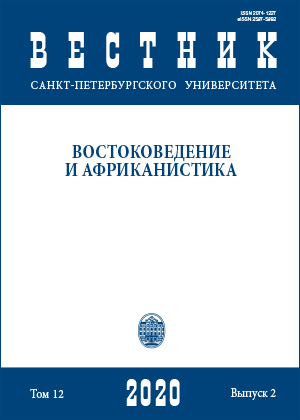The Development of Concepts of ‘Author’ and ‘Authorship’ in Hausa Culture
DOI:
https://doi.org/10.21638/spbu13.2020.209Abstract
Hausa literature is one of the well-studied African literatures. This paper explores Hausa creative writing, focusing both on the figure of author, marubuci, and the changes the concept of ‘author’ has undergone, motivated by social perceptions and demands. Modern mass media call attention in different ways to writers and their creative writing. Therefore, interviews with authors may provide valuable information, that has before now remained unexplored by the researchers, as well as some unique insights into the world of Hausa creating writing. Interviews constitute a particular genre in media industry contributing social communication and discussion. They also serve as a reliable source for understanding writer’s self-perception, and the perception of creative writing and authorship in the context of social and literary change. This paper explores interviews with several prominent Hausa language authors; among them are Shu’aibu Makarfi, Bilkisu Funtuwa, Binta Salma Mohammed, Hafsatu Ahmad Abdulwaheed, Ismail Bala Garba, Rahma A. Majid, and Bashir Abubakar Umar. The study seeks to prove that the nature of interaction between a writer’s self-perception and social expectations/ social perceptions for both creative writing and marubuci is a significant factor, that defines the development of Hausa literary movement. Moreover, that the development of Hausa literature in Northern Nigeria has been determined mostly by the self-perception of the authors, who aimed to improve literary tradition, and thus introduced new experimental trends, attitudes and forms into the literature. The study concludes that the contribution of modern Northern Nigerian writers to shaping the future development of Nigerian literature will definitely grow.
Keywords:
Hausa written literature, Hausa creative writing, Hausa popular literature, marubuci, soyayya literature, labarun soyayya, Shu’aibu Makarfi, Bilkisu Funtuwa, Binta Salma Mohammed, Ismail Bala Garba, Hafsatu Ahmad Abdulwaheed, Rahma A. Majid, Bashir Abubakar Umar.
Downloads
References
Downloads
Published
How to Cite
Issue
Section
License
Articles of "Vestnik of Saint Petersburg University. Asian and African Studies" are open access distributed under the terms of the License Agreement with Saint Petersburg State University, which permits to the authors unrestricted distribution and self-archiving free of charge.





